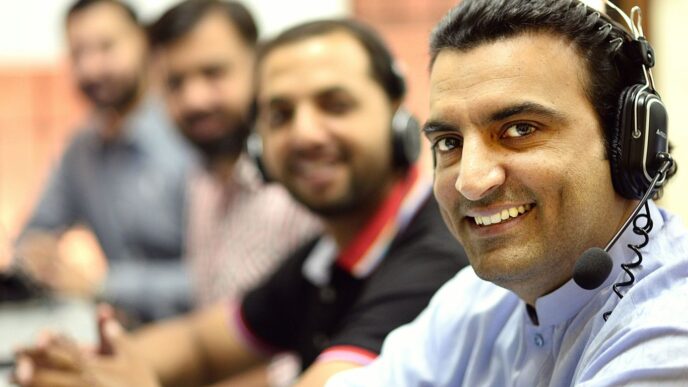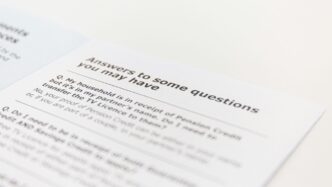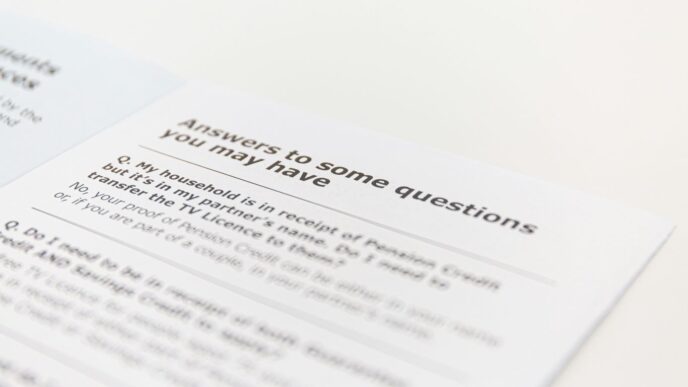Talking to reporters can feel like walking a tightrope sometimes, right? They’ve got a job to do, and you’ve got your own story to tell. Knowing how to handle those reporter questions, especially the tough ones, is a big deal. It’s not about being sneaky; it’s about being clear, honest, and getting your message across without getting tripped up. This guide breaks down how to deal with all sorts of reporter questions, from the simple to the really tricky.
Key Takeaways
- Be ready for surprise questions. Reporters might ask something unexpected later in an interview to catch you off guard. Having a plan, like sticking to your main points or knowing how to briefly address unrelated topics, can help you stay steady.
- When faced with a question that’s way off topic, it’s okay to suggest discussing it another time. If the question is outside your area of knowledge, politely steer the conversation back to what you’re there to talk about.
- For questions about specific issues, try answering with a broader perspective. This can help you frame the situation in a more general, less problematic way, especially if you don’t have all the details yet.
- Reporters often look for conflict or criticism to make their stories more interesting. Be aware of this and think about how to respond to questions that try to pit you against others or ask for negative opinions.
- Always have your main messages ready. If a reporter asks several questions at once, pick the easiest one that lets you get your key points across first. This often leads to more helpful follow-up questions.
Understanding Tricky Reporters Questions
Reporters are trying to get to the heart of a story, and sometimes that means asking questions that can feel a little… off. It’s not always about catching you out, but they do need to dig for the real facts. Knowing how to handle these curveballs is a big part of talking to the press. You don’t want to get flustered and say something you regret, right? It’s about staying calm and giving a solid answer, even when the question is unexpected or seems a bit out of left field.
Anticipating Unexpected Inquiries
Sometimes, an interview starts out easy, and then BAM! A question pops up that you weren’t ready for. This often happens later in the chat, when you might be feeling a bit too comfortable. The reporter might be trying to catch you off guard. The best thing to do is to just answer the question if you can. If you’ve done some prep, you should have a way to handle most things. If you really can’t answer, there are ways to say so without just shutting down.
- Answer directly: If you know the answer, give it. It usually looks better to the audience.
- Pivot to your message: If the question is a bit sideways, try to steer the conversation back to what you want to talk about.
- Offer context: Sometimes, a question is about one small thing. You can answer it by talking about the bigger picture instead.
Strategies for Handling Off-Base Questions
What do you do when a reporter asks something that has nothing to do with what you agreed to discuss? It happens. Maybe the topic is outside your area of knowledge, or it’s just not relevant to your main point. You can politely suggest talking about it another time, especially if it’s something you’re not prepared to discuss.
For example, let’s say you’re supposed to talk about your company’s new product launch. But the reporter asks about a rumor concerning an employee. You could say something like, "We don’t typically discuss personnel matters publicly. However, we do have processes in place to look into any issues that arise and address them promptly." This acknowledges the question without getting into details you shouldn’t.
Responding to Questions Seeking Critique
Reporters often look for conflict because it makes for a more interesting story. They might ask you to comment on a competitor, a past mistake, or a negative review. This is where you have to be careful. Getting drawn into criticizing someone else can make you look bad.
- Don’t engage in mudslinging: Avoid directly criticizing individuals or other organizations. It rarely ends well.
- Focus on your own work: Talk about what you’re doing well and your positive contributions.
- Acknowledge and move on: If you must address a negative point, do so briefly and then quickly pivot back to your main message. For instance, if asked about a past issue, you might say, "We learned a lot from that situation and have since implemented changes to prevent it from happening again." Then, immediately talk about your current successes.
Mastering Common Reporters Questions
Reporters often ask questions that get to the heart of what you do. It’s not about being tricky, but about getting the story. Knowing how to handle these common inquiries can make a big difference in how you and your work are presented.
Describing Your Research Process
When a reporter asks about your research, they’re not just curious about your methods; they want to understand the foundation of your work. It’s your chance to show the rigor and thought that goes into what you do. Think about it like explaining how you bake a cake – you wouldn’t just say ‘I mixed stuff and baked it.’ You’d talk about the ingredients, the order, the temperature, and why you chose that recipe.
Here’s a way to break down your process:
- Initial Idea/Question: Where did the idea for this research or project come from? What problem were you trying to solve or what question were you trying to answer?
- Gathering Information: What steps did you take to collect data or information? This could involve surveys, interviews, looking at existing documents, experiments, or observations.
- Analysis and Synthesis: How did you make sense of all the information you gathered? Did you look for patterns, compare different pieces of data, or use specific tools or techniques?
- Drawing Conclusions: What did you find out? What are the main takeaways from your research?
For example, if you’re a scientist, you might say, "We started by noticing a trend in X. Then, we designed an experiment to test our hypothesis, carefully controlling for variables like Y and Z. After collecting the data, we used statistical analysis to see if the results were significant, which led us to conclude that…"
Ensuring Accuracy in Reporting
Accuracy is the bedrock of good reporting, and reporters know this. When they ask about how you ensure accuracy, they’re looking for signs of professionalism and a commitment to truth. It’s not just about getting the facts right once, but having systems in place to keep them right.
Think about it this way: if you’re building something, you double-check your measurements, right? Reporting is similar.
Here are some key practices:
- Fact-Checking: Always verify information from multiple reliable sources before publishing or broadcasting. Don’t rely on a single source, especially for critical details.
- Source Vetting: Understand who your sources are and why they might have a particular perspective. Are they experts? Do they have a vested interest in the story?
- Clear Attribution: Make it clear where information comes from. If you’re quoting someone, state their name and title. If you’re using data, cite the source.
- Review and Editing: Have a process for reviewing your work before it goes out. This could involve editors, peer review, or even just taking a break and coming back to it with fresh eyes.
If asked directly, you could say, "My top priority is getting the story right. I always cross-reference information with at least two independent sources, and I’m careful to attribute every piece of data or quote. We also have an internal review process where editors check for factual errors before anything is published."
Building and Maintaining Sources
Sources are the lifeblood of reporting. They provide the information, the context, and often, the human element that makes a story compelling. When reporters ask about your sources, they’re interested in how you find people to talk to and how you keep them talking to you.
It’s like tending a garden; you need to plant seeds, water them, and keep the pests away to get a good harvest.
Consider these points:
- Developing Trust: Be honest and transparent with your sources about who you are, why you’re asking questions, and how their information will be used. Respect their time and their willingness to speak with you.
- Active Listening: Really listen to what your sources are saying, not just waiting for your turn to talk. Ask follow-up questions that show you’re engaged and trying to understand.
- Protecting Confidentiality: If a source asks to remain anonymous, honor that request. Breaking confidentiality can destroy trust and harm your reputation.
- Nurturing Relationships: Stay in touch with sources, even when you’re not working on a specific story. A quick email or call to see how they’re doing can go a long way.
When asked, you might explain, "Building good relationships with sources takes time and effort. It’s about being reliable, respectful, and always following through on your promises. I try to understand their perspective and make sure they feel comfortable sharing information with me. Sometimes, it’s just a matter of checking in regularly to see what’s new."
Navigating Ethical Reporters Questions
Dealing with reporters can sometimes feel like walking a tightrope, especially when the questions start to touch on tricky ethical ground. It’s not just about getting the facts right; it’s about how you get them and what you do with them. This is where your integrity as a journalist, or as someone speaking to the press, really gets tested.
Addressing Ethical Dilemmas in Reporting
Reporters might ask about tough spots you’ve been in. They want to know if you can think through a problem and make a good call. It’s not about having a perfect record, but about showing you’ve learned and that you take these issues seriously. Think about a time you had to make a difficult choice. Maybe you got some information that could have been obtained in a questionable way. Did you use it? Why or why not? The key is to show you understand that trust is built on doing the right thing, even when it’s hard.
Here’s a way to think about it:
- Identify the dilemma: What was the specific ethical problem?
- Outline your options: What were the different paths you could have taken?
- Explain your decision: Why did you choose the path you did?
- Reflect on the outcome: What did you learn from the experience?
For instance, if you were given documents that might have been leaked unethically, you could explain that you chose not to use them until you could confirm their authenticity and how they were obtained. It shows you prioritize ethical standards over a quick story. You can find more on ethical standards in journalism.
Handling Sensitive Topics with Care
When a reporter asks about a sensitive subject, like a personal tragedy or a controversial issue, they’re looking for empathy and respect. It’s easy to get caught up in the story and forget the human element. Your goal is to provide information without causing further harm or distress. This means being mindful of the language you use and the details you share. Sometimes, it’s better to stick to the facts and avoid speculation or overly emotional responses. If you’re not comfortable discussing certain aspects, it’s okay to say so politely. You can also steer the conversation back to the main points you want to convey.
Balancing Objectivity and Personal Beliefs
This is a big one. Reporters might ask how you handle topics that go against your personal views. The expectation in journalism is to remain neutral and report the facts, even if you disagree with them. It’s about separating your job from your personal life. You need to show that you can present information fairly, without letting your own opinions color the story. This doesn’t mean you don’t have beliefs; it means you can set them aside to do your job. You can explain that your commitment is to accuracy and fairness, relying on verified information rather than personal feelings. It’s about presenting a balanced picture for the audience.
Answering Reporters Questions Under Pressure

Sometimes, you just get hit with a question when you’re already feeling the heat. Maybe the deadline is looming, or you’ve got a stack of other things to do. It’s a lot, right? Reporters know this, and sometimes they’ll ask something tough when they sense you’re stretched thin. The trick is not to let that pressure make you stumble.
Managing Tight Deadlines Effectively
Deadlines are a reporter’s best friend and worst enemy. When you’re on a clock, it’s easy to feel overwhelmed. But think of it like this: you’ve got to get the job done, and you’ve got to do it well. So, what’s the game plan?
- Prioritize ruthlessly. Figure out what absolutely has to be done first. Don’t get bogged down in the small stuff if the big stuff is waiting.
- Break it down. A huge task feels impossible. Chop it into smaller, manageable pieces. Checking off those little wins can really help.
- Communicate. If you’re drowning, let people know. Maybe someone can help, or maybe the deadline can be nudged a bit. It’s better than just failing silently.
Producing Quality Work Under Pressure
It’s one thing to rush, it’s another to rush and still make something good. The goal is to keep your standards up, even when time is short. How do you do that?
Think about what you’re trying to achieve. What’s the main point you need to get across? Keep that front and center. Don’t get sidetracked by trying to make everything perfect if ‘good enough’ will get the message out. Sometimes, a solid, on-time piece is way better than a perfect piece that’s late.
Prioritizing Stories with Multiple Assignments
When you’ve got more than one thing going on, it’s like juggling. You can’t just focus on one ball and let the others drop. You need a system.
Here’s a way to think about it:
- Assess the urgency and importance. What’s the most critical thing right now? What has the biggest impact?
- Estimate the time needed. How long will each task realistically take?
- Schedule it out. Block out time for each assignment. Be realistic about how much you can actually do in a day.
It’s about being smart with your time and energy. Don’t be afraid to say no if you’re already overloaded, or to ask for help if you need it. It’s better to do a few things well than many things poorly.
Communicating Complex Reporters Questions
Sometimes reporters hit you with questions that feel like trying to explain quantum physics to a toddler. It’s not that they’re trying to be difficult, but the topic itself might be pretty dense, or maybe they’re just trying to get to the heart of a complicated issue. The goal here is to make sure your audience understands what you’re talking about, without making them feel like they need a degree in the subject.
Making Complex Topics Understandable
When you’re faced with a question about something intricate, like a new policy change or a scientific breakthrough, the first step is to take a breath. Don’t panic. Think about who you’re talking to. Most likely, it’s not a room full of experts. You need to translate.
Here’s a breakdown of how to approach it:
- Identify the core concept: What’s the absolute main point you need to get across?
- Know your audience: Who are you speaking to? What do they already know (or not know)?
- Simplify the language: Ditch the jargon. If you have to use a technical term, explain it right away.
- Use relatable examples: Connect the complex idea to something everyday.
For instance, if you’re explaining a new financial regulation, you wouldn’t just throw out terms like ‘derivative markets’ or ‘liquidity ratios.’ Instead, you might say something like, "Think of it like the rules for a neighborhood bake sale. We need to make sure everyone is playing fair and that there’s enough cake for everyone who wants a slice." It’s not perfect, but it gets the idea across.
Using Analogies and Simplified Language
Analogies are your best friend when explaining tough stuff. They create a mental picture that helps people grasp abstract ideas. For example, comparing a computer’s RAM to a workbench where you temporarily place tools you’re using can make the concept of short-term memory much clearer. Or, explaining how a blockchain works by comparing it to a shared, unchangeable ledger that everyone in a community can see. It’s about finding those everyday parallels.
Simplified language is just as important. Read your explanation aloud. Does it sound natural? Or does it sound like you’re reading from a textbook? If it’s the latter, try again. Short sentences and direct phrasing work wonders. Avoid passive voice; active voice is usually more direct and easier to follow. Remember, the reporter is looking for a clear story, and your job is to help them get there.
Incorporating Visual Aids and Expert Quotes
While you might not always have control over visual aids during a live interview, you can certainly suggest them or refer to them if they’ve been provided. If you’re talking about a complex process, mentioning a diagram that shows the steps can be helpful. For written pieces, think about charts or infographics. These visual tools can break down data or processes in a way that text alone can’t. You can find great examples of how news organizations use visuals to explain complex topics on sites like NPR.
Expert quotes are also gold. When you bring in an expert, you’re not just adding credibility; you’re also providing another voice that can explain things differently. A good quote from a specialist can often cut through the complexity and offer a clear, concise explanation that resonates with the audience. It’s like having a translator for your audience, making sure the message lands correctly.
Handling Feedback on Reporters Questions
So, you’ve done the interview, and maybe it didn’t go exactly as planned. Or perhaps it went great, but you still got some notes back. That’s totally normal. Getting feedback on how you handled reporter questions is actually a good thing. It means someone’s paying attention, and it’s a chance to get better.
Think of it like this: you wouldn’t expect to be a pro athlete after one game, right? Same idea here. Reporters are trained to ask tough questions, and sometimes, even when you think you nailed it, there’s room for improvement. The goal isn’t to be perfect, but to be prepared and to learn from every interaction.
Accepting Constructive Criticism
When feedback comes in, try not to get defensive. It’s easy to do, especially if you feel like you were misunderstood. But constructive criticism is gold. It points out blind spots you might not see yourself. Maybe you used too much jargon, or perhaps you didn’t quite answer the question directly. A good reporter will often give you specific examples of where you could have done better. Listen to those examples. They’re the real meat of the feedback.
Here are a few ways to approach criticism:
- Listen actively: Don’t interrupt. Let the person finish their thoughts.
- Ask clarifying questions: If something isn’t clear, ask for more detail. "Can you give me an example of what you mean by that?"
- Take notes: Jotting things down helps you remember and shows you’re taking it seriously.
- Thank them: Even if it stings a little, thank the person for their time and input. It keeps the door open for future conversations.
Implementing Feedback for Improvement
Okay, so you’ve heard the feedback. Now what? The real work is putting it into practice. This is where you actually get better. If the feedback was about answering questions more directly, practice that. If it was about simplifying your language, try to rephrase your usual talking points in simpler terms. It might feel awkward at first, but that’s how you build new habits.
Consider creating a personal feedback log. You can track the type of feedback you receive and the steps you’re taking to address it. It’s a way to see your progress over time.
| Type of Feedback | Specific Issue | Action Taken |
|---|---|---|
| Directness | Didn’t answer the question head-on | Practiced answering questions with a clear "yes" or "no" first. |
| Clarity | Used too much technical language | Rewrote key messages using simpler vocabulary. |
| Tone | Sounded defensive | Focused on calm, measured responses in practice. |
Responding to Corrections and Retractions
Sometimes, despite your best efforts, a story might come out with an error. This is where you need to be professional. If a reporter or outlet corrects a factual mistake, acknowledge it. It shows integrity. If it’s a significant error that requires a retraction, work with the reporter and their editor to ensure it’s handled properly. This isn’t about being right; it’s about maintaining trust and accuracy in reporting. You can find resources on media training that cover how to handle these situations gracefully.
Remember, every interaction with the media is a learning opportunity. Embrace the feedback, and you’ll find yourself becoming more confident and effective with each interview.
Demonstrating Essential Journalism Skills
So, you’ve landed an interview for a journalism gig. That’s great! Now, how do you show them you’re not just some person who likes to write, but someone who can actually do the job well? It’s all about showcasing those core skills that make a good reporter tick. Think of it as putting your best work on display, but instead of a gallery, it’s a conversation.
Showcasing Writing and Research Abilities
This is pretty straightforward, right? They want to know you can put words together in a way that makes sense and that you can find the facts to back it up. It’s not just about stringing sentences together; it’s about clarity and accuracy. When you talk about your past work, don’t just say you wrote an article. Explain how you found the information. Did you dig through public records? Did you talk to people who were actually there? Your ability to find reliable information and present it clearly is the bedrock of good journalism.
Here’s a quick way to think about it:
- Research: What steps did you take to get the facts straight?
- Writing: How did you organize the information so it’s easy for readers to follow?
- Accuracy: What checks did you put in place to make sure everything was correct?
Highlighting Interviewing Techniques
Talking to people is a huge part of this job. It’s not just about asking questions; it’s about listening, really listening, and knowing what to ask next. You need to make people feel comfortable enough to talk, even when the topic is tough. Think about a time you had to get information from someone who wasn’t exactly eager to share. How did you approach that? Did you build rapport first? Did you ask open-ended questions that encouraged them to elaborate?
Good interviewing involves:
- Preparation: Knowing who you’re talking to and what you need to find out.
- Active Listening: Paying attention to what’s being said, and what’s not being said.
- Follow-up Questions: Asking the right questions based on the answers you receive.
Emphasizing Critical Thinking and Adaptability
This job throws curveballs. You have to be able to think on your feet and adjust when things don’t go as planned. Maybe a source backs out, or a story takes an unexpected turn. How do you handle that? It’s about looking at a situation, figuring out the best way forward, and not getting flustered when the plan changes. Being able to adapt to new information or unexpected challenges is key. You also need to be able to look at information and figure out what’s important, what’s relevant, and what’s just noise. It’s about making sense of chaos, really.
Wrapping Up: Your Media Interview Toolkit
So, we’ve gone over a bunch of ways to get ready for talking with reporters. It’s not about being tricky or having all the answers right away. It’s more about being prepared, knowing what you want to say, and staying calm when things get a little heated. Remember those key messages you practiced? Keep them handy. And don’t forget to listen carefully to the questions. Sometimes, the best move is to take a breath, answer what you can, and if you need to, steer the conversation back to what’s important. Being interviewed can feel like a test, but with a little practice and these tips, you can handle it like a pro. It’s all about clear communication and sticking to your points.
Frequently Asked Questions
What are some tricky questions reporters might ask, and how should I prepare for them?
Reporters sometimes ask unexpected questions, especially towards the end of an interview, to see how you react. To handle this, try to answer the question directly if you can. If the question is way off-topic from what you agreed to discuss, you can suggest talking about it later. Sometimes, it’s best to give a broader answer that touches on the main point without getting into too much detail, especially if it’s about private matters or something you don’t know much about. The key is to stay calm and stick to your main messages if possible.
How do journalists do their job, and what skills do they need?
Journalists gather and share news. They interview people, look into stories, and check facts to make sure the information is correct. To do this well, they need strong writing skills to explain things clearly, research abilities to find information, good interviewing techniques to get answers, critical thinking to understand different sides of a story, and the ability to adapt quickly because the news changes all the time.
How can I make complicated topics easy for people to understand?
When explaining something complex, use simple words and comparisons, like telling a story or using an analogy. Visuals, like charts or pictures, can also help a lot. Including quotes from experts can add authority and make the information clearer. The goal is to break down big ideas into smaller, more digestible pieces so everyone can follow along.
What’s the best way to handle having too many stories to work on at once?
When you have a lot on your plate, it’s important to figure out what’s most important. You need to manage your time well, decide which stories need to be done first, and still try to do a good job on all of them. Sometimes, you might need to ask for help or adjust your schedule to make sure everything gets covered accurately, even when things are busy.
How should I respond if a reporter asks for my opinion on someone else’s work or a sensitive issue?
Reporters often look for conflict or different viewpoints. If asked to criticize someone or a sensitive topic, try not to get drawn into negativity. You can offer a more general perspective or focus on your own work and policies. For sensitive subjects, approach them with care and respect, ensuring you represent all sides fairly and ethically.
What should I do if I make a mistake in my reporting?
Everyone makes mistakes sometimes. If you realize you’ve reported something incorrectly, it’s important to admit it. Tell your editor right away and work to fix it, maybe by issuing a correction or retraction. Being honest and fixing errors quickly helps maintain trust with your audience and shows you’re responsible.














